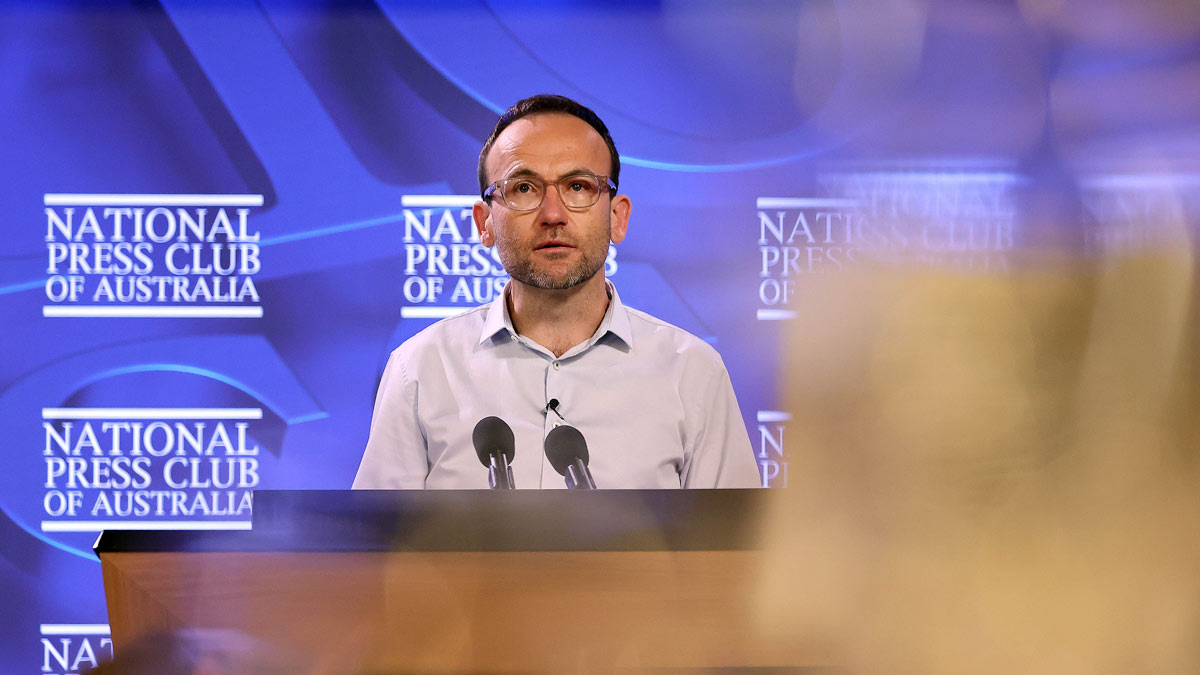The Australian Greens will double down on its push for a national moratorium on new coal and gas projects, with Greens leader Adam Bandt questioning whether the new Albanese government really wants to ‘end the climate wars’.
In prepared remarks to the Australian Clean Energy Summit in Sydney on Wednesday, Bandt says the Greens will continue to argue that properly addressing climate change precludes any expansion of the fossil fuel industries.
“We’re in a crisis and we need to act like it. It’s caused by mining and burning coal, oil and gas,” Bandt says.
“You don’t tackle a crisis by pouring more fuel on the fire. You tackle a crisis by addressing the cause. By powering past coal and gas.”
Bandt will lead a much enlarged Greens contingent when federal parliament convenes next week, sitting for the first time since the federal election that delivered victory for the Albanese government.
The Greens will now hold a dozen seats in the federal Senate, as well as four seats in the House of Representatives, its largest ever representation and providing it with a key balance-of-power position in the upper house.
Bandt hopes the Greens will be able to leverage this position to secure additional commitments from the Labor government, saying Labor could not bring about an end to the so-called ‘Climate Wars’ without first stopping the growth of the fossil fuel industries.
“Labor wants to end the climate wars, but they’re not going to do it with a target of 43 per cent emissions reduction by 2030 and opening up new coal and gas projects,” Bandt says.
“We need government-led action, in partnership with industry and business, to empower people, create, hundreds of thousands of jobs, and deliver a safe, fair, and prosperous future for all.”
“The future is renewable. We’re blessed with incredible assets. It’s about time we acted like we’re in a crisis.”
Labor will likely depend on the support of the Greens to secure the passage of legislation throughout the new parliamentary term – not just on climate policy issues- but has the alternative path of negotiating with the Coalition opposition.
It will require the Greens to take a somewhat pragmatic approach to its negotiations, pushing hard enough to win concessions, but not adopting too a strong form of brinkmanship such that it opens the door to the Dutton-led Coalition.
While it appears likely that the Greens will support Labor to pass legislation enshrining its targets in law, the Greens appear set to take up the fight over coal and gas developments.
Pressed on the prospect of a coal and gas moratorium, federal environment minister Tanya Plibersek told the National Press Club on Tuesday that Labor would not be “breaking its promises” and effectively ruled out any prospect the new government would commit to halting the development of new coal and gas projects.
“I think any government that, six or seven weeks into the term, starts breaking promises is heading for trouble,” Plibersek said.
“We made a promise on a zero net emissions with an interim target of 43 per cent carbon pollution reduction. We will keep that promise.”
“On the issue of new coal mines, mining has been a really important part of Australia’s prosperity for decades, for generations in fact. Mining will continue to be an important part of Australia’s prosperity.”
Before the federal election, Labor said any projects that “stacked up” environmentally and economically would be approved.
Plibersek’s comments followed the release of the latest ‘State of the Environment’ report, which outlined the ongoing and substantial deterioration of Australian environmental and ecological systems, in large part due to climate change.
Bandt said Labor’s stance could allow for further climate change-driven damage to sites like the Great Barrier Reef, while also amplifying the economic damage being caused by growingly extreme weather events.
“Under Labor’s plans, 1-in-25 homes in Australia will be uninsurable by 2030. In the Northern Rivers of NSW, 1-in-5 homes will be uninsurable,” Bandt says.
“We will lose the Great Barrier Reef and the 67,000 tourism jobs that go with it. Certain crop failures will more than double, and catch from marine fisheries will halve.”
“We are locking in more and more extreme weather, damaging more people, property and infrastructure for decades to come.”
“Our challenge is to push the government further and faster,” Bandt adds.










